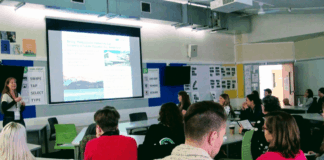BM: My name is Babalwa Makwetu and I graduated in 2012.
NN: And my name is Nolufefe Ntshuntshe, I graduated in 2011.
Tegan Arazny (TA) [Dialogue]: WHAT ARE YOU CURRENTLY DOING WITH YOUR CAREER OR WHAT HAVE YOU DONE SINCE YOU LEFT MAGNET THEATRE?
BM: I am freelancing. I have performed in different productions at Artscape, Market Theatre, even across the country, Switzerland, Italy, yeah, around.
NN: And teaching!
BM: Yeah, I’m also doing teaching here at Magnet. I teach singing. Recently, I’m going to Grahamstown for the National Arts Festival.
[…]

NN: I just started rehearsals today for a piece called Pieces, directed by a young female director who won the Theatre Arts Admin Bursary. Aside from that, I’m working with the MotherTongue Project, which is based in McGregor and I work with the youth of the organisation. Facilitate creative processes and, so far, this year we’re working with Helios Theater. And I also took part in ASSITEJ [Cradle of Creativity] Festival that just ended with this lady here [Babalwe Makwetu]. And I’ve also done other productions with Koleka Putuma, also at Artscape Theatre last year and this year. I also did a solo piece at Infecting the City Festival for two years consecutively – a piece I choreographed myself and performed myself.
Tegan Arazny (TA) [Dialogue]: WHAT HAVE YOU TAKEN FROM YOUR TRAINING AT MAGNET THEATRE THAT’S REALLY STUCK WITH YOU?
NN: What I’ve taken from my training at Magnet is how to create work, how to investigate a piece that’s onstage, or a piece that I’m wanting to put onstage, or a piece that I’m assisting in putting onstage. So, the creative sides of creating, or of theatre-making, is what I’ve taken from Magnet.
“What I’ve taken from my training at Magnet is how to create work, how to investigate a piece that’s onstage, or a piece that I’m wanting to put onstage” – Nolufefe Ntshuntshe
BM: It’s many things actually but I think it’s discipline that stands out […] It’s discipline.
TA: DO YOU HAVE A MEMORY OF SOMETHING, A MAGICAL MOMENT, OR SOMETHING FUNNY IN YOUR TRAINING, THAT COMES TO MIND WHEN YOU THINK OF MAGNET THEATRE?

BM: Jennie made me do clown. I felt so stupid but, at the same time, I fell in love with it and I still wish I could get more jobs [that encompass clowning] because I think it relates to my personality. I’m not a clown but I can relate to it. That was just another moment. Even my family, when we were graduating and we were showcasing the pieces, and then I did clown and everyone was surprised, “we were expecting you to do sing, act or do something else – but clown! Wow!” And they can’t stop laughing. Even now, they still imitate me. It was out of this world.
NN: I have so many memories. One would be performing in Inxeba Lomphilisi at the Baxter [Theatre] and in Grahamstown [National Arts Festival]. You know, the production directed by Mandla Mbothwe. That production stays with me. And that’s one memory that I’m very fond of. And another one was when we did a production called The Children and the Bees. We had so much fun and it was directed by Mark Fleishman himself. What was fun about it was he took the trainees, which was our year, and a number of kids from different community theatre groups, from high schools, kids that were involved in theatre and drama in their schools and it was a process filled with so much fun and I think I also learned quite a lot from that process.
TA: WHY DO YOU THINK IT’S IMPORTANT FOR PROGRAMMES LIKE MAGNET TO KEEP GOING?
BM: Because people need training. You know we have talent and all that but without training it can be difficult sometimes. You see even the way people look at you, how people approach you, even when they want you to work with them. They don’t just come to you and say, “Come, okay, I have this production, let’s work.” People know that, “Now I’m going to talk to Babalwa Makwetu BECAUSE she’s a graduate from Magnet. We must set the meeting and we must talk with us, talk business, you know.” I think it’s important also in that way.
“People know that, ‘Now I’m going to talk to Babalwa Makwetu BECAUSE she’s a graduate from Magnet” – Babalwa Makwetu
[…]
NN: Just to layer that, because you can be talented, but without a platform, no one will know who you are and you won’t know who is out there and I feel like Magnet is that platform for many people who come from these underprivileged communities because somebody maybe knows that there’s a UCT [University of Cape Town] Drama School but they can’t afford to pay for it or, for some reason or another, they just can’t or don’t know how to. But once you go to Magnet you get almost the same thing you get at Drama School because everything that you learn here is everything that is taught at UCT. And the teachers that come in are more or less the same teachers that lecture at Drama School […] and the nice thing is that Magnet is very practical. They teach you and then they give you a platform to have a performance where a paying audience comes in, or even if it isn’t a paying audience but [just] an audience, because Magnet has a following, it’s a name, so you get to be exposed to a theatre audience.
“Magnet has a following, it’s a name, so you get to be exposed to a theatre audience” – Nolufefe Ntshuntshe
And, another thing […] that I’m missing about Magnet is we got to have [theatre] visits, very often. At Magnet, you get to go to the theatre, watch shows and then get to review them […] sometimes you hear that there is a show playing. You can’t afford to buy yourself a ticket, or you can’t afford to transport yourself back because shows start at 7 pm but Magnet also allows that platform of growth. Because I believe you grow by practice, but you also grow by watching. So, it is very important that it happens because it opens doors to people that don’t have access to those that are within the industry.
“it opens doors to people that don’t have access to those that are within the industry” – Nolufefe Ntshuntshe
Please click here to access Dialogue’s other posts in this series of interviews with alumni and staff of Magnet Theatre.
The Full-Time Training and Job Creation Programme receives support from TK Foundation, Rand Merchant Bank, Oppenheimer Memorial Trust, Hosken Consolidated Investments Ltd Foundation, Rolf-Stefan Nussbaum Foundation, Ampersand Foundation, Potjie Foundation, Business Arts South Africa, Western Cape Government Department of Cultural Affairs and Sports Expanded Public Works Programme, Joan St Leger Lindbergh Charitable Trust, and Distell.
Transcribed by Norah Ringma
© Dialogue Community Performance / Magnet Theatre









